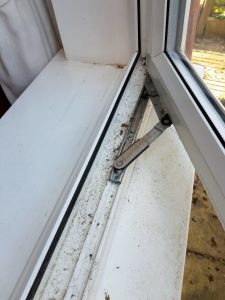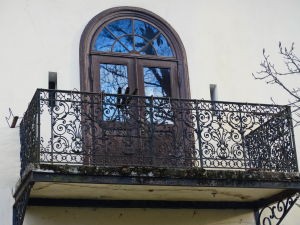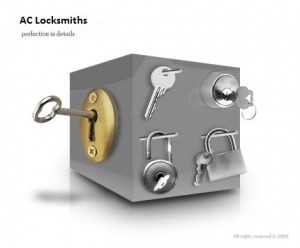It’s that time of year again when the weather starts to do funny things to our doors. I am already being called out to do jobs that could be avoided with some basic maintenance for your locks.
Here on the Norfolk Coast, locks are not only at risk of rusting, but also damage from sea salt and wasps (more on those later).

So what can you do to avoid having to call me, or at least make the call a bit cheaper?
Firstly, keep your door (and window) locks clean. It’s very easy to forget about the front edge of a door when it is shut while you clean, but I see some shocking sights in my work. The more dirt and dust is allowed to build up, the more it finds its way into the working parts of your lock eventually causing damage.

The next step is oiling your locks. There is a lot of argument in the locksmithing world as to whether WD40 or graphite is better. For me, I say WD40 used twice a year (every time you change your locks is an easy way to remember and perfect for changes in weather) works just fine because it coats and flushes at the same time. Oiling does not mean just squirting a bit of oil where you put your key in the lock. If you have a wooden door with a mortice (“Chubb” type) lock, then the part inside stops the oil getting to where is needed and if you have a lock with a “Yale” type key, then oil in the key way is only getting a tiny percentage of what needs to be oiled. If you have any lock with a latch, either pull the handle down or rotate any lever knob to retract that latch. If you look where the latch retracts, you will see that the wedge shape of the latch will create a perfect gap for you to put in the straw provided with cans of WD40. Squirt for about 5 seconds (10 seconds if first time) and then work the handles, etc a few times to get the oil all over the insides.
On doors with multipoint locking systems (eg UPVC doors) you should also look at the front edge and lift the handles up and down a few times. Give another squirt of oil to anything you see moving. When you do this, you might even find the sticker that tells you to oil the door that you never knew was there and the installer never told you about! If you have a wooden door with a single deadlock, unscrew the faceplate at the front and take it off. This will now give you a larger gap around bolt. You might have to hold the WD40 straw in one corner, but squirt what you can, being aware you might get some splash back at you and oil does not clean up from clothes easily, so no maintenance in your wedding dress/designer suits. Don’t forget to put the face plate back on afterwards. In all cases, put some rags on the floor as oil will run down and drip off the bottom of the door and WD40 even stains paving stones.
Once you have done all the above, keep an eye on how difficult your door is to open. Hotter summers are warping even doors that never recognisably warped before. If your door is becoming difficult to operate in any way, there will be undue stress on various parts of your lock which will eventually lead to something breaking. The most common problem last year was French doors shrinking away from each other and the hooks of the multipont mechanisms not being able to get into their slots. Multipoint mechanism doors are usually adjustable, if your door is not as easy to operate when closed as it is open, best get the door adjusted before something breaks and you will have to add a locking product on to the cost of the adjustment.
Finally, those pesky wasps. If you have a wooden door with a multipoint locking system (lift the handles to lock) and it does not have top and bottom bolts, there will be a gap at the top behind the metal faceplate. This gap runs down behind the faceplate as far as the first moving part you can see. It is the perfect size for wasps to make cells in which to grow more baby wasps. Those cells harden a lot and can cause the mechanism to break. My advice is to at least put insect repellent all over the top of the door and then maybe stick a small cotton wool ball just in the top to bar access. I’ve dealt with a few of these cases now, and I really don’t like angry wasps trying to get me while I destroy their hard work!

If you have any questions regarding the above information, please don’t hesitate to get in touch by phone, text or email.
Thanks for reading.
Here at AC Locksmiths Norfolk, it has always been my aim to provide quality work with fair pricing. We are still the only company in the area to give prices on our website so you can know before you even call what prices are likely to be. Regular customers will know that I have never charged for a second visit if I do not have what you need on board at first contact, and if you call me to do a second job within 6 months, I have been doing these jobs labour free where possible. My other desire was always to keep AC Locksmiths prices the same whether you call me out at 2pm on a Monday, or 2am on Bank Holiday weekend. I have been able to keep this going for twelve years, but unfortunately, to stay in business and to stay competitive, changes have to be made.
My AC Locksmiths prices will always be displayed on the website, so that you the customer, will know I am honest about what I charge. While my profit margin remains low, extra cost of materials leading to increased prices will push me over the VAT threshold and prices displayed will not include the VAT price, so when that is applicable I will make that clear in my pricing list.
While I am no longer able to do second visits for free in all cases, they will still be free if the item I am missing is a basic everyday lock. In all other cases, repeat visits will be charged at a half labour rate, and separate jobs will incur the full labour rate regardless of time in between visits.
Between the hours of 7am and 7pm Mon – Fri, my rates for the new financial year will remain the same as before. But evenings, weekends and bank holidays will see an increase to £95. This is a flat fee for emergency work and will apply if the job takes five minutes or five hours. For non-emergency work, the cost will be £75 for a single lock change/short job, £150 for a half day, and £250 for a full days’ work. All large value jobs will require a 50% deposit.
Despite these changes, I will still continue to help advise my customers on lock and mechanism maintenance to help the locks last longer, I will still tell you if there is a way to do the job yourself when you call me. I will still not charge you if you call me out when you actually need a door fitter instead.
I will still offer a comprehensive range of services, including all below and more:
- Gain entry
- Lock fitting
- Lock upgrades
- Alarm fitting
- Internal CCTV
- Smart locks
- Vehicle entry
- Empty home management (look after your 2nd home/look after home after death of a relative, etc)
- House clearance
- Repeat maintenance
Find our full price list here: https://www.ac-locksmiths-norfolk.co.uk/prices-2024/
Thanks for reading, Alan
At last the days are noticeably longer and snowdrops & daffodils are out in bloom, signalling that spring is here. Many of us are looking forward to the summer holidays and dreading the big spring clean. Hopefully the worst of the wet weather is behind us and we can start those little jobs we have all been putting off. And that should include maintaining our locks.
We rely on our cars to get us to work and therefore keep checks on oil, water tyre pressure, etc. We rely on our locks to keep our homes and valuables safe, so why do we just let them deteriorate when just a few minutes basic work can keep them going for much longer, saving you money in the long run.
So let’s start with the ones that really get the weather: Garden sheds usually have the more basic locks or padlocks. Being at the cheaper end of the market, these are more susceptible to rust, so give them a good squirt with oil everywhere you can find a hole. This also loosens grit that can wear down the internal moving parts.
With Night Latches (referred to often as ‘Yale’ type locks) the only exposed area is usually just the part where the key goes in. But again, giving this a good squirt with oil can revitalise the lock. If the door opens outwards, or there is any way the weather can get to the inside, then this should be oiled as well. This will involve undoing some screws to take it off, but do this slowly so you can see how it goes back on. Once the night latch is off of the door, you will be able to see good areas into which you can squirt some oil.
For UPVC doors, the entire mechanism that runs down the leading edge of the door needs to be oiled. There are lots of working parts here, and they are prone to grit and small breakages inside that can stop the system working. If you know how to remove a cylinder, take it out to really get oil inside the main working part. If you don’t know how to do it, it might be worth paying a locksmith or double glazing fitter to show you how so you can maintain it yourself. Remember, a small cost now could save you a much larger cost later. And a good tradesman will show you how to take care of these doors.
For mortice (referred to as ‘Chubb’) type locks the need for regular oiling becomes very clear if ever you take one out of the door. They seem to magnetise dust and soak up moisture from wet doors causing rust. So if you have a mortice lock with handles (called a ‘Sash Lock’) pull the handle down, which retracts the latch, then squirt a good amount of oil into the hole. This should give the inside a basic rinse. If your mortice lock is of the simple ‘turn key to open’ style (called a ‘dead lock’) then this can be a bit more tricky to get into. You really have to squirt into the small gap between the bolt and the lock casing.
The other thing to be looking out for with the change of weather is locks getting more difficult to operate. I have spoken about this in previous blogs, but if your lock becomes difficult to work for any reason, then you should call a locksmith. A small labour charge now is better than hoping the problem will go away, because if you break the mechanism, especially on UPVC doors, it can get very costly. If your handles have gone a bit floppy, this is the first visual sign that things have already gone too far and at any point you could find yourself locked out.
If you would like further advice on any of the above issues, please get in touch via our contacts page or give us a call 07846 643176 07846 643176
07846 643176
Thanks for reading.







